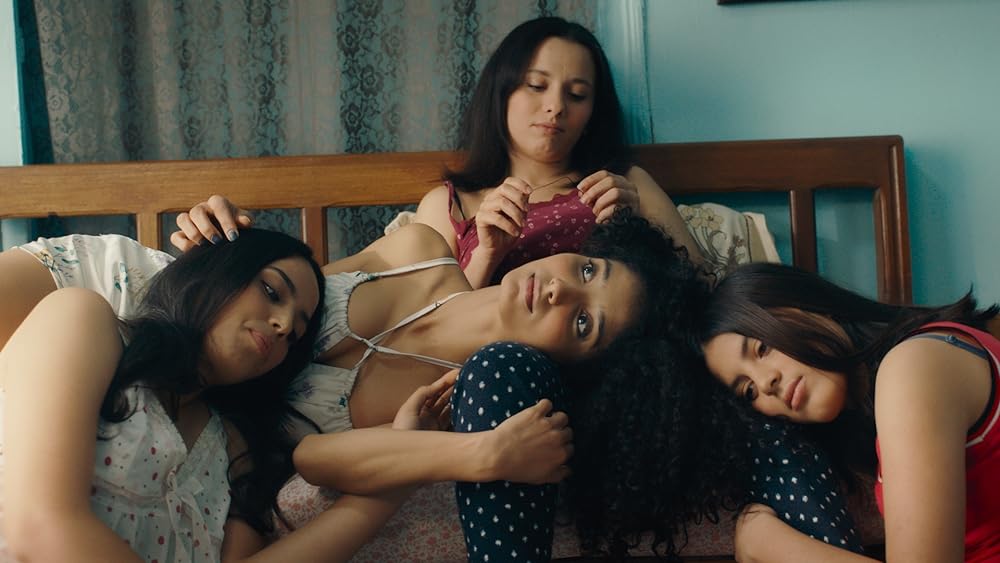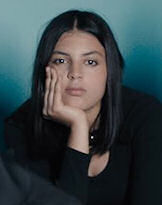It was 2015 when Barack Obama approved the bombing of an Islamic terrorist center in Libya. Here, Noureddine Chouchane, a militant commander connected to two deadly attacks in neighboring Tunisia, was killed. Surviving were his wife and his wife’s sister. “Four Daughters” examines what might have influenced these women to leave their home and join Daesh, Chouchane’s terrorist organization, in the first place.
One of the five nominees for a Best Documentary Oscar, “Four Daughters,” features females in a convoluted moral world in Tunisia. The mother, Olfa, grew up as a strong-willed, weight-lifting, short-haired Muslim woman, who felt she needed to feign being a man to protect her mother. She was forced to marry, but beat up her new husband, drawing blood on their wedding night.
Nevertheless, she ended up having four beautiful daughters. But, still rebellious, she left her husband and took on a lover, recently out of prison for murder, who had sex with her and at least her two oldest daughters. This is just the beginning of a tangled story of cultural, familial, and internal conflict that ultimately leads to tragedy.
Two actresses were hired to play the two older sisters, but the real family members play themselves, except when an actress takes over for the mother. Throughout, all five women give asides and commentaries.
What stands out is that the mother, Olfa, has a history of being unable to moderate her own behavior. When her older daughter bleaches the lower section of her hair blue she beats her with a hose until she thinks she is dead. Later, this same girl’s favorite “game” is being wrapped in a shroud and having her sisters pretend to bury her alive.
Though the family exists in a hurricane of emotional turbulence, they smile and laugh at their ridiculousness when they recount their remembrances.
What is not ridiculous is that in 2023, after seven years of incarceration, the two oldest girls were sentenced to 16 more years in prison in Libya for their association with Daesh. That Olfa and her two youngest daughters might view this film as some kind of vehicle for social redemption or absolution is a fantasy. Instead, it reveals extraordinary personal instability and dangerous extremism within a dysfunctional family. For any kind of transformation or healing, a facilitating counselor should have been present during the filming and included in the film.
While it is a unique story-telling strategy to use actresses to interact with family members in re-enactments, it goes against the traditions of a documentary. Strictly speaking, most rules for documentary awards are stricter than those used for Cannes, where “Four Daughters” tied for the Best Documentary award. For example, the rules of the Online Film Critics Society state that “only films which document actual events or situations through use of filmed interviews or archived footage and with limited event reenactments are eligible for this award.” There are no photos or archived footage in this film, except for one TV media clip.
While “Four Daughters” does provide a startling and creatively filmed window on the potential effects of female abuse and repression and how that may relate to extremism, it is a subjective, idiosyncratic account that lacks the lens and objectivity of a true documentary. In the Oscar competition, it steals the spotlight from potentially more impactful docs like “Still: A Michael J. Fox Movie,” “Beyond Utopia,” and “American Symphony.”

Credits
Director/Writer: Kaouther Ben Hania
Producers: Nadim Cheikhrouha, Habib Attia, Thanassis Karathanos, and Martin Hampel
Cinematography: Farouk Laaridh
Cast: Hend Sabri, Olfa Hamrouni, Eya Chikahoui, Tayssir Chikhaoui, Nour Karoui as Rahma Chikhaoui, Ichraq Matar as Ghofrane Chikhaoui, and Majd Mastoura
Editors: Kaother Ben Hania, Qutaiba Barharnji and Jean-Chistophe Hym
Music: Amine Bouhafa
Release: Oct. 27, 2023 (limited)
Official website: https://kinolorber.com/film/four-daughters
How to see: Amazon Prime
. . .
Join us on Facebook at
http://www.facebook.com/itsjustmovies!
